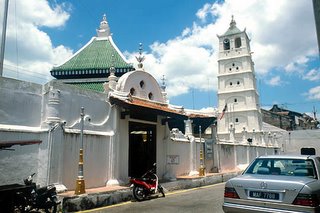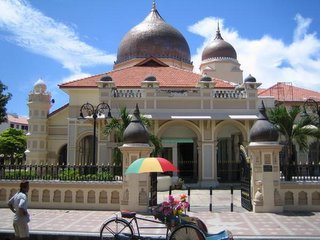
The Kampung Keling Mosque, Melaka
During the final day of Ramadhan, while waiting to break fast, I had a chat with my dad, just a simple chat trying to pass away time. Out of nowhere the word KELING came into the discussion. My Mom like to use that word and I keep on telling her that she should control the usage of that word as we have quite a few families of Indian origin in the neighbourhood.
My dad feel strongly that the word is not derogatory, in fact he pointed out historical reasoning that that particular word has always been used even in the Malay Annals (Sejarah Melayu) for example, occurs in the second chapter dealing with the exploits of RajaChulan, whom the emperor of China is said to refer to as 'Raja Keling' or even such as Hang Nadim's visit to'Benua Keling' - which must refer to India generically. This reminds me of a debate not long ago that a group is planning to sue Dewan Bahasa & Pustaka over the usage of 'keling' in the dictionary even when the DBP dictionary has already designated the word as "kata kuranghalus" followed by the remark of Badruddin Amiruldin (BN-Jerai) in Parliament on Oct 25 (see also Bernama)
Sabri Zain pointed that Nicholas Belfield Dennys' 'A Descriptive Dictionary of British Malaya' (1894) defined 'Kling' as "a general term for all the people of Hindustan, and for the country itself". Scareboeus is quoted in the 16th September 1887 issue of The Penang Gazette as stating that "the word Kling is a most interesting one and points to a connection between the Straits and India reaching nearly as far back as the time of Alexander the Great, the only trace of which remains in its continued application to the natives of Southern India."He adds that the word was not only used in the Straits but all over theDutch and Portuguese possessions in the East Indies.What is important to note, however, is that none of these examples ofthe use of the word or references to 'kelings' - from the Sejarah Melayu in the 16th century down to the British travelogues of the 19th century- were in any way used in any derogatory sense or intended as racial slurs. It was simply a word to describe the people of South India or their descendants in the Peninsula. We've heard of 'keling mabuk todi' or 'keling karam' - but I doubt if 'India mabuktodi' or 'India karam' would be deemed less of a racial slur.
I guess those terms must be looked upon as one of our invaluable heritage to be preserved! in the days of yore,"kelings" travelled on ships from the indian ports and anyone who has been in their company must be accustomed to their love ofover-dramatizing situations and exaggeration. This is a historical perception of "kelings" and it is essential to keep such term intact so that future generations may not lose sight of their cultural roots. Our past colonial administrators have labelled the malays as variously as "indigent","indolent","lazy",etc etc but i do not recall that any malays ever clamouring forthese references to be removed.
Maybe Norman Fernandez in the article in Malaysiakini ‘Keling’ remark: MIC impotent, without dignity and Premnath Badruddin belongs in circus should take a note here.
Photo: Masjid Kapitan Keling, Penang

Oh and some info out of the topic... if you are really a fan of Penang Nasi Kandaq, try the Nasi Kandar right next to Masjid Kapitan Keling in Penang. Its only available at night and even at 2a.m. you will find people queuing in front of the shop.
No comments:
Post a Comment